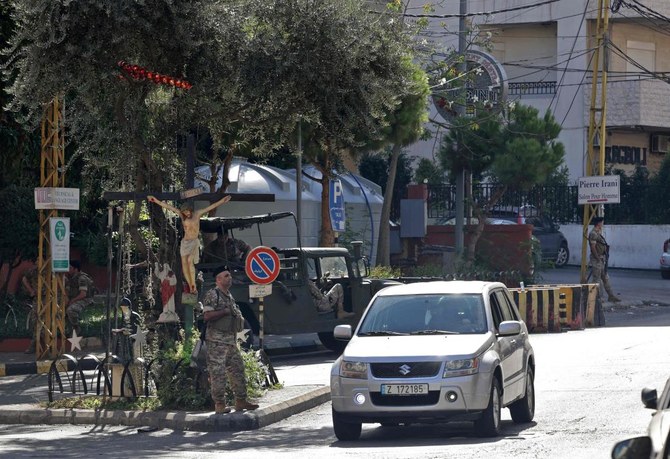BEIRUT: The Lebanese Army on Friday set up checkpoints in the Tayouneh area and on roads leading to Beirut’s northern and southern suburbs after gunfights left seven people dead on Thursday.
Investigations by specialized military units have not identified the direct cause of the clashes between armed members from Hezbollah and the Amal Movement on one side, and opposing gunmen that the two parties claimed were from the Lebanese Forces Party.
“The army command’s statement about Thursday’s events left things ambiguous until further investigations,” a military source told Arab News. “But what we are sure of is that the sniper shots fired at Hezbollah and Amal targeted the head, chest, and abdomen areas as most injuries were among those.”
The shootout lasted more than three hours and also left 32 people injured, including two soldiers.
What was supposed to be a peaceful demonstration on Thursday quickly turned into anarchy. Hezbollah and the Amal Movement had hit the streets demanding the removal of Judge Tarek Bitar from the investigation of the Beirut port blast before bullets and rocket-propelled grenades started flying.
On Friday, the military source said “13 persons were arrested, including concierges of the buildings that snipers used to shoot at the demonstrators in the streets from their rooftops. Members affiliated with the Lebanese Forces party, who were spotted on the battlefield, were also arrested. The army resorted to CCTV footage for evidence.”
Later in the evening, state National News Agency said Lebanon had detained 19 people in relation to recent gunfire in Beirut.
A national day of mourning for the victims was declared on Friday as schools, banks, and government offices across Lebanon were shut down. Guns were fired in the air during funerals for the victims in Beirut’s southern suburbs and Bekaa.
The full extent of damage caused to buildings, properties, and parked cars during the shootout was revealed on Friday. People who returned to their homes expressed deep anger at the events and asked, “Who will compensate us for the human and material losses?”
Signs of destruction were left by the B7 grenades while bullet holes were very clear on the buildings in the Tayouneh area. An uneasy calm reigned on Friday as shops were closed and very few people walked in the streets. All cars and motorcycles that passed through the area were searched by authorities.
In order to prevent more escalation, a military source said the airborne division was assisting the army in Ain Remaneh and Chiyah, “in case something happens, given that this area has become very sensitive.”
Faisal bin Farhan, Saudi Arabia’s foreign minister, said he is “certainly worried” about the political and economic situation in Lebanon as it requires action “now.” He said the events over the past two days showed that Lebanon needs real, serious change and that the responsibility lies with the country’s leaders.
The Saudi Foreign Ministry said in a statement that the Kingdom is following events in Lebanon closely. The Kingdom hopes the situation will stabilize as soon as possible and that Saudi Arabia stands with the people of Lebanon, the statement said.
According to their sources, Hezbollah and the Amal Movement have requested to remove Bitar from the investigation into the Beirut port blast on Aug. 4, 2020, which killed more than 200 people and wounded thousands.
“The judiciary must find a formula that can restore the constitutional order and declare that the defendants, who are former ministers and deputies, should be prosecuted before the Court of Ministers and Presidents,” An official source from Amal Movement told Arab News.
Lawmaker Jalal Abdullah said the case is very sensitive and requires accurate follow-up.
“Why did a demonstration, which was supposed to be peaceful, turn into an armed clash? The truth needs to come out,” he said. “The demarcation lines carry a bloody history in the memories of the Lebanese, and we do not want to reminisce these memories regardless of what happened.”
Abdullah told Arab News that “after what happened on Thursday, all kinds of immunity of the highest-ranking to the lowest-ranking security officials must be lifted to allow the truth to come out. Some are very concerned about this investigation and the role of Judge Bitar in his investigations. What is needed today is for everyone to abide by the process of the law.”
Mohanad Hage Ali, director of communications and a fellow at the Malcolm H. Kerr Carnegie Middle East Center in Beirut, said the Tayouneh crime might be used politically to counter the port crime.
“I do not think that Hezbollah was not expecting blood by getting its supporters into this sensitive area,” he said. “Hezbollah is very concerned about the investigations and the possibility of being accused by Judge Bitar. This is only a possibility. But what we know so far at face value, is that Hezbollah is defending its allies, the Amal Movement and Marada Movement, whose ministers are defendants in the port explosion case.”
Ali expressed concern about Hezbollah’s behavior and feared assassination attempts in the near future.
“Just like what happened after the assassination of (former premier) Rafic Hariri until the assassination of (author and activist) Luqman Slim,” he said.
The EU condemned the use of violence and expressed its condolences to the families of the victims, calling for “utmost restraint to avoid further senseless loss of life.”



























